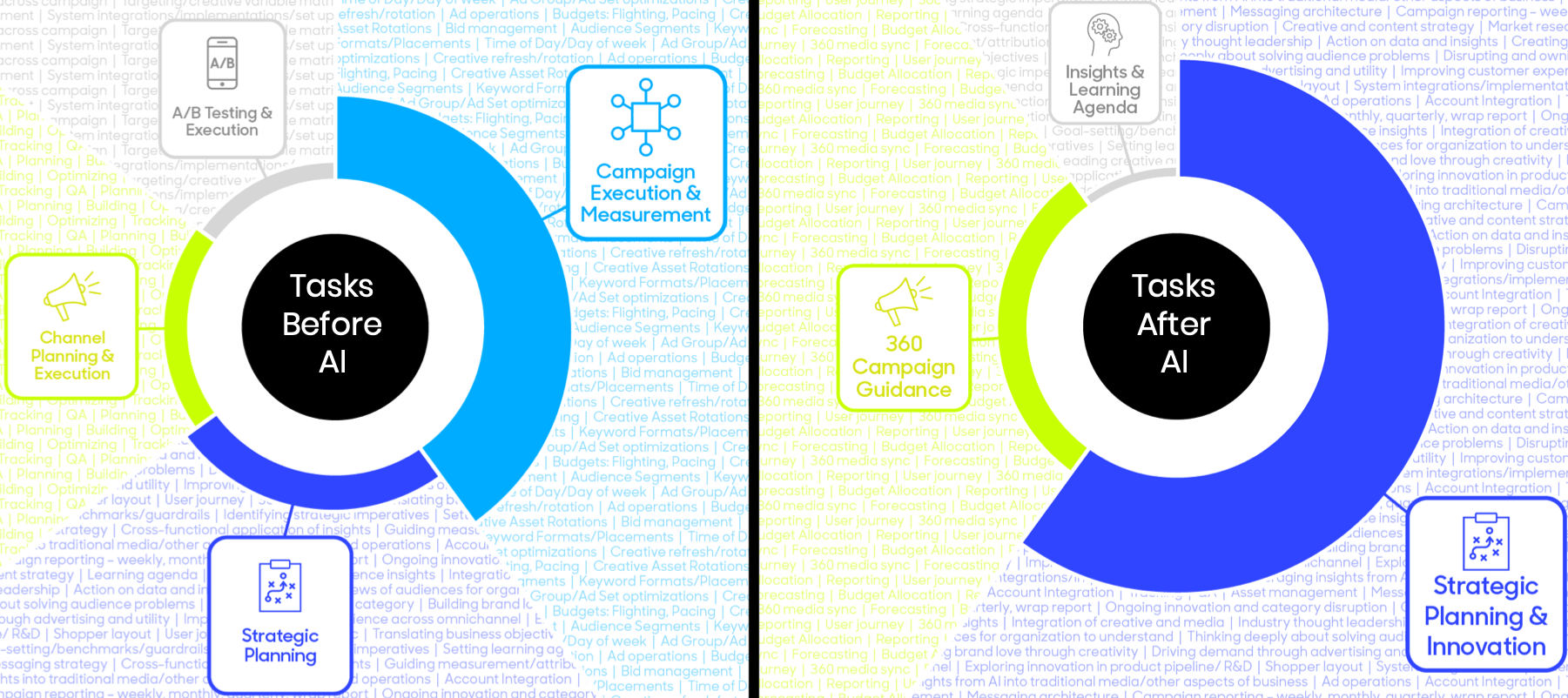New Tenets of Digital Marketing: #1 Recruit for Human Intelligence
07/23/2019

This post is the first tenet in our series The New Tenets of Digital Marketing.
The growth in digital marketing channels and the rapid evolution of consumer technology has forever transformed the marketing landscape. With the transformation that has taken place, where does this leave the role and responsibilities of marketers today? More importantly, what are the skills and expertise needed for the modern marketing org? Understanding the evolving role and capabilities of technology will be crucial in order for marketing leaders to define and develop effective teams to meet today’s challenges.
To date, the expansion of digital marketing and the adoption of new technologies has translated into more work for marketing teams. Due to these new demands on bandwidth, marketers have been pulled away from their core purpose of customer centricity to manage time-consuming tasks such as bid adjustments, keyword expansion, rotating creatives, and more.
However, with more sophisticated technologies, like autonomous AI-powered ad tech, coming to market, we are beginning to see a tipping point. These robust technologies are ushering in a new tier of benefits for marketers – taking on the heavy lifting of time-consuming, rote tasks, allowing faster and more informed decision-making, and enabling the ability to modify ad spend and execute targeted marketing campaigns in real-time.
In this post, we’ll uncover how these new technologies are elevating the role of marketing organizations and marketers, and what skills CMOs and marketing leaders should be developing and hiring for in 2019 and beyond.
How New Tech is Powering Marketing Organizations
Today, informed marketing leaders are adopting innovative technologies, specifically autonomous AI capabilities, and tapping into newfound advantages over the market. These include:
- ‘In-sourcing’ rote, mechanical tasks. By leveraging autonomous AI, marketers can boost productivity with an ‘incremental’ workforce, without multiplying the size of their teams. By letting the machines take on manual, time-consuming tasks, technology is helping to increase bandwidth and allow marketing teams to perform beyond their size.
- Making more and better decisions. New autonomous AI technologies arrive at optimal spend thresholds by analyzing hundreds of targeting and creative variables and making decisions in real-time – a task that would take human counterparts many months and advanced skill sets to run as effectively, let alone take action on. Leveraging autonomous AI enables marketing teams to make more confident decisions based on more conclusive data, multiplying their productivity.
- Unifying Silos. One of the least addressed benefits of autonomous AI technologies is its ability to enable marketers to see through silos of data and to access a more complete view of the advertising landscape. By applying the power of AI across channels, marketers gain access to holistic insights into channel performance, audience segments, and return-on-investment, informing initiatives across the marketing org.
How Machines are Elevating the Role of Marketers
Today, we are seeing emerging technologies, specifically, new AI technologies, start to turn the tide and improve marketing bandwidth. The first phase of AI introduced assisted AI technologies, which helped to accelerate data processing and optimization suggestions, enabling marketers to see where campaign efficiencies could be gained, much more quickly than before. However, the responsibility to take meaningful action on the analysis still required human time and bandwidth.
With Autonomous AI, the role of the machine becomes greater and the technology moves beyond the operational tasks of number crunching and data analysis to decision-making and execution. By moving monotonous, time-consuming tasks to machines, the marketers’ role can become more strategic.
What the Modern Marketing Org Should Look Like
How do new technological capabilities impact the division and collaboration of marketing responsibilities between human and machine? What are the pivotal marketing skills to hire for today? How should CMOs and marketing leaders think about the allocation of resources across their marketing organizations?
As machines take on more of the mechanical tasks, marketing leaders can focus on developing and expanding their capabilities. For organizations that are employing autonomous AI capabilities, we have identified four key areas that will drive significant impact within marketing organizations in 2019 and beyond:
- Data Analysis. With more data being collected than ever before and greater machine-powered analytics capabilities, marketing teams will need individuals who can identify the story and insights behind the data for the purpose of taking meaningful action.
- Media Strategy. As the interplay of all channels and devices online and offline continue to evolve and the customer journey becomes more complex, teams will need individuals who know how, where and with what messages to connect with audiences to draw them closer to the brand.
- Creative Storytelling. Increased competition for audience attention demands compelling campaigns that attract, pique, and engage audiences. Teams will – more than ever – need creative minds who understand the role of original thought and the art of advertising.
- Connectors. As campaign strategies address more channels and customer segments, marketers’ ability to connect learnings across brands, portfolios and their organization will become the key to meaningful and sustainable change.
As we’ve uncovered, today’s digital marketing landscape is complex and rife with competition for customer attention. In order to be effective, marketers will need to focus on their core function and what they do best – delivering on human empathy, creativity, and innovation – here’s a before and after visualization. Meanwhile, machines will be pivotal in helping marketers to achieve this, by managing, analyzing, and making optimizations off data in real-time. This transformation will not happen on its own, but rather marketing leaders will need to be strategic in both the adoption of key technologies and in developing and hiring for the roles and skills needed for the modern marketing org.
Read more in our second post of the series – Tenet #2: Winning at Every Stage of the Customer Journey.

